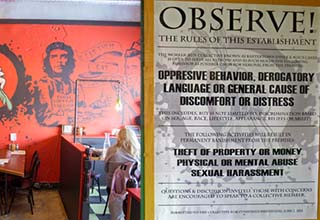Men and Women. Are We Really Equal
Figured I would start off this weeks arguing and name calling with some equal rights examples that are not really equal or right.
This is an article by Terry McDermott of the Seattle Times.
Mary LeTourneau, 35, a schoolteacher, has an affair with a 13-year-old boy, a former student of hers.
The affair produces a guilty plea to charges of second-degree child rape. It also produces a baby and, last week, a suspended sentence.
Mark Blilie, 42, a schoolteacher, has an affair with a 15-year-old girl, a former student of his.
The affair produces a conviction for third-degree child rape and child molestation and four years in the joint for Blilie.
What's wrong with this?
I mean, other than the fact that both these people did horrible things, that they abused children and the hopes and trust of entire communities.
What's wrong, of course, is the similarity of the situations and the vastly different outcomes.
How did this happen?
The answers are as simple as human history, and as complicated as the human heart.
Mr. McDermott offers a clue, in the different ways in which the newspapers covered the two incident.
He quotes one passage from a recent newspaper account of LeTourneau's sentencing hearing:
"During the sentencing, the mother of the boy forgave LeTourneau, who appeared in an aquamarine sweater, black pleated skirt and her hair pinned up with soft tendrils." Other newspaper accounts frequently describe the perpetrator as blond and attractive.
By contrast, there was no physical description of him whatsoever in any of the stories written about Mark Blilie. Judging from a photograph taken on the day of his sentencing, however, he is a tall, handsome, dark-haired man.
The pictures of the two abusers are accompanied by different captions. The Seattle Times photograph of Blilie had a caption identifying him as "convicted child rapist Mark Blilie." By contrast, the caption accompanying the photograph of Mary LeTourneau taken at her sentencing identified her as a "former teacher."
McDermott is clear that he is not suggesting that Blilie should have evaded prison or that LeTourneau should be sent there. But he observes that the circumstances of the two cases are so strikingly similar that one would think they'd receive similar sentences.
McDermott points out that neither Blilie nor LeTourneau had previous criminal histories.
The chief difference is Blilie is a man, LeTourneau a woman.
There are a few things Mr. McDermott, a columnist for The Seattle Times, was not free to say about The Seattle Times' coverage. Note that in the case of the man who had the affair with the 15-year-old girl, they had comments from a deputy prosecutor that "she doesn't think she's in love ... she doesn't think she's exploited." Lucy Berliner, head of the county hospital's sexual assault center, is quoted as saying any adult-teenager sexual relationship is likely to be exploitative. It seems The Seattle Times forgot to ask her opinion when it was a 13-year-old boy and not a 15-year-old girl. Similarly, The Seattle Times forgot about Roger Wolfe, a local sex-offender treatment provider. Last year, when it was a man that was the perp, they quoted him extensively, as the sidebars show. Maybe Roger Wolfe, like so many men and women who fail to recognize that males are also sexually abused, just thought the victim "got lucky." Or maybe The Seattle Times thought that since the perp was an attractive female, it was a lot more important to show compassion to her than it was to offer any sympathy or support for the abused kid whose live was forever changed dramatically by this sick woman. As the deputy prosecutor The Seattle Times quoted a year ago said, "She doesn't think she's being exploited. She's in love. She thinks when she's 18, she'll marry the guy."
Of course, just a year ago, The Seattle Times said: "But just as 15-year-olds aren't allowed to drive, buy liquor or vote, by state law they're deemed to lack the capacity to consent to sex with adults." (see sidebar) But that's only if there's a 15-year-old girl involved. If it's a 13-year-old boy, it's much more important to show compassion for the poor perpetrator.
McDermott then turns to the fast-developing area of evolutionary biology which, he says, "is spooling out ingenious Darwinian explanations of human sexual behavior: Men seek multiple sexual partners to increase their chances of reproducing; women seek them to set up a competition among sperm - may the best man win."
According to these theories, sexual desire is physical, and in some sense we can't control the desires we have. We're "hard-wired" for reproduction. What we live to for is simply to pass our genes on to the next generation. That's what our desires encourage us to do.
McDermott would guess that virtually everybody would explain Mark Blilie's actions "as a result of nothing more than sexual desire, inadequately constrained."
LeTourneau has contended in a recent Town Meeting TV show and elsewhere throughout her ordeal that her only defense is from the heart, that it's a case of love. She says she fell in love with him, and although she acknowledges what she did was wrong, she says she still continues to love him.
McDermott says that "the boy was old and wise beyond his years and points out that his own mother calls him an "old soul." LeTourneau says this does not excuse her actions, but might help explain them. McDermott counters, "Actually, no, it doesn't help explain them. In fact, in some ways it makes them even more confusing and disconcerting." He continues:
Love, unlike desire, is a human invention. It is almost entirely a creation of culture and is in large part a product of intention.
In some sense, it would be easier to accept LeTourneau saying she got carried away by rash and unfortunate desire. To say she loved the boy is to say she wanted to happen what did. It further mystifies everyone but her.
We can accept the fact that some people are just plain bad. When they commit crimes, we understand that bad people do bad things.
But when good people do bad things and do them on purpose, we are left without our normal, comforting rationalizations. It's very scary because in the end we are left to wonder: What about us?






7 Comments